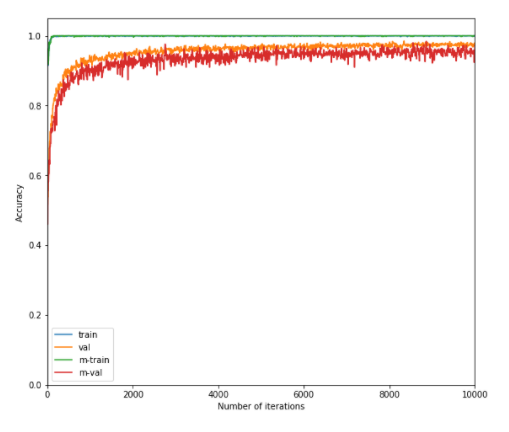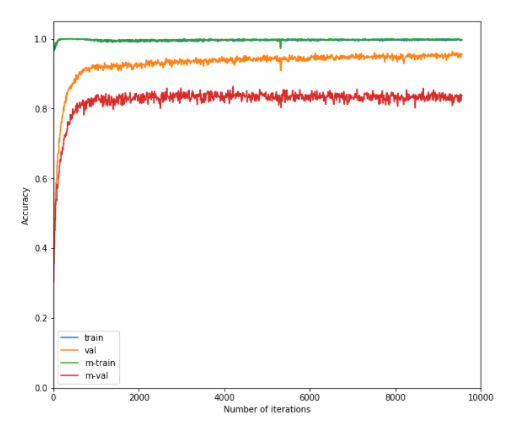Hi kelly, I read the code and find that the get_data_loader function get the same batch samples every iteration, is that you want? (sorry, I'm not familiar with the maml algorithm.)
below is the samples got from the get_data_loader funtion.
('test train loader: ', ['../data/omniglot/images_evaluation/Kannada/character01/1205_20.png',
'../data/omniglot/images_evaluation/Manipuri/character05/1323_07.png',
'../data/omniglot/images_evaluation/Angelic/character06/0970_19.png',
'../data/omniglot/images_evaluation/ULOG/character14/1611_15.png',
'../data/omniglot/images_evaluation/Keble/character02/1247_11.png',
'../data/omniglot/images_evaluation/Kannada/character05/1209_20.png',
'../data/omniglot/images_evaluation/Sylheti/character05/1507_12.png',
'../data/omniglot/images_evaluation/Manipuri/character15/1333_01.png',
'../data/omniglot/images_evaluation/Kannada/character27/1231_08.png',
'../data/omniglot/images_evaluation/Mongolian/character30/1388_20.png',
'../data/omniglot/images_evaluation/Keble/character07/1252_12.png',
'../data/omniglot/images_evaluation/Tibetan/character05/1560_19.png',
'../data/omniglot/images_evaluation/Glagolitic/character14/1128_04.png',
'../data/omniglot/images_evaluation/Ge_ez/character06/1094_07.png',
'../data/omniglot/images_evaluation/Avesta/character05/1067_17.png',
'../data/omniglot/images_evaluation/Malayalam/character05/1276_16.png',
'../data/omniglot/images_evaluation/Aurek-Besh/character03/1039_18.png',
'../data/omniglot/images_evaluation/Syriac_(Serto)/character14/1493_07.png',
'../data/omniglot/images_evaluation/Keble/character16/1261_09.png',
'../data/omniglot/images_evaluation/Aurek-Besh/character13/1049_15.png'])
('test train loader: ', ['../data/omniglot/images_evaluation/Syriac_(Serto)/character14/1493_07.png',
'../data/omniglot/images_evaluation/Sylheti/character05/1507_12.png',
'../data/omniglot/images_evaluation/Keble/character16/1261_09.png',
'../data/omniglot/images_evaluation/Ge_ez/character06/1094_07.png',
'../data/omniglot/images_evaluation/Tibetan/character05/1560_19.png',
'../data/omniglot/images_evaluation/Manipuri/character05/1323_07.png',
'../data/omniglot/images_evaluation/Kannada/character05/1209_20.png',
'../data/omniglot/images_evaluation/Manipuri/character15/1333_01.png',
'../data/omniglot/images_evaluation/Avesta/character05/1067_17.png',
'../data/omniglot/images_evaluation/ULOG/character14/1611_15.png',
'../data/omniglot/images_evaluation/Glagolitic/character14/1128_04.png',
'../data/omniglot/images_evaluation/Malayalam/character05/1276_16.png',
'../data/omniglot/images_evaluation/Aurek-Besh/character13/1049_15.png',
'../data/omniglot/images_evaluation/Kannada/character01/1205_20.png',
'../data/omniglot/images_evaluation/Keble/character02/1247_11.png',
'../data/omniglot/images_evaluation/Angelic/character06/0970_19.png',
'../data/omniglot/images_evaluation/Aurek-Besh/character03/1039_18.png',
'../data/omniglot/images_evaluation/Mongolian/character30/1388_20.png',
'../data/omniglot/images_evaluation/Kannada/character27/1231_08.png',
'../data/omniglot/images_evaluation/Keble/character07/1252_12.png'])
('test train loader: ', ['../data/omniglot/images_evaluation/Kannada/character05/1209_20.png',
'../data/omniglot/images_evaluation/Malayalam/character05/1276_16.png',
'../data/omniglot/images_evaluation/Manipuri/character05/1323_07.png',
'../data/omniglot/images_evaluation/Tibetan/character05/1560_19.png',
'../data/omniglot/images_evaluation/Kannada/character27/1231_08.png',
'../data/omniglot/images_evaluation/Ge_ez/character06/1094_07.png',
'../data/omniglot/images_evaluation/Keble/character16/1261_09.png',
'../data/omniglot/images_evaluation/Kannada/character01/1205_20.png',
'../data/omniglot/images_evaluation/Glagolitic/character14/1128_04.png',
'../data/omniglot/images_evaluation/Angelic/character06/0970_19.png',
'../data/omniglot/images_evaluation/Aurek-Besh/character03/1039_18.png',
'../data/omniglot/images_evaluation/ULOG/character14/1611_15.png',
'../data/omniglot/images_evaluation/Aurek-Besh/character13/1049_15.png',
'../data/omniglot/images_evaluation/Keble/character02/1247_11.png',
'../data/omniglot/images_evaluation/Sylheti/character05/1507_12.png',
'../data/omniglot/images_evaluation/Avesta/character05/1067_17.png',
'../data/omniglot/images_evaluation/Manipuri/character15/1333_01.png',
'../data/omniglot/images_evaluation/Syriac_(Serto)/character14/1493_07.png',
'../data/omniglot/images_evaluation/Mongolian/character30/1388_20.png',
'../data/omniglot/images_evaluation/Keble/character07/1252_12.png'])
('test train loader: ', ['../data/omniglot/images_evaluation/Keble/character02/1247_11.png',
'../data/omniglot/images_evaluation/ULOG/character14/1611_15.png',
'../data/omniglot/images_evaluation/Tibetan/character05/1560_19.png',
'../data/omniglot/images_evaluation/Kannada/character27/1231_08.png',
'../data/omniglot/images_evaluation/Kannada/character05/1209_20.png',
'../data/omniglot/images_evaluation/Syriac_(Serto)/character14/1493_07.png',
'../data/omniglot/images_evaluation/Aurek-Besh/character03/1039_18.png',
'../data/omniglot/images_evaluation/Avesta/character05/1067_17.png',
'../data/omniglot/images_evaluation/Glagolitic/character14/1128_04.png', '../data/omniglot/images_evaluation/Malayalam/character05/1276_16.png', '../data/omniglot/images_evaluation/Mongolian/character30/1388_20.png', '../data/omniglot/images_evaluation/Manipuri/character15/1333_01.png', '../data/omniglot/images_evaluation/Manipuri/character05/1323_07.png', '../data/omniglot/images_evaluation/Aurek-Besh/character13/1049_15.png', '../data/omniglot/images_evaluation/Sylheti/character05/1507_12.png', '../data/omniglot/images_evaluation/Kannada/character01/1205_20.png', '../data/omniglot/images_evaluation/Ge_ez/character06/1094_07.png', '../data/omniglot/images_evaluation/Keble/character07/1252_12.png', '../data/omniglot/images_evaluation/Keble/character16/1261_09.png', '../data/omniglot/images_evaluation/Angelic/character06/0970_19.png'])
('test train loader: ',


 Line 10, Algorithm2 from the original paper indicates that meta_update is performed using each D'_i. To do so with your code, I think the function meta_update need access to every task sampled, since each task contains its D'_i in your implementation.
https://github.com/katerakelly/pytorch-maml/blob/75907aca148ad053dfaf75fc138319f0d89534a8/src/maml.py#L172
However, it seems that you perform meta_update with a single task, resulting in using only one D'_i of a specific task.
Line 10, Algorithm2 from the original paper indicates that meta_update is performed using each D'_i. To do so with your code, I think the function meta_update need access to every task sampled, since each task contains its D'_i in your implementation.
https://github.com/katerakelly/pytorch-maml/blob/75907aca148ad053dfaf75fc138319f0d89534a8/src/maml.py#L172
However, it seems that you perform meta_update with a single task, resulting in using only one D'_i of a specific task.